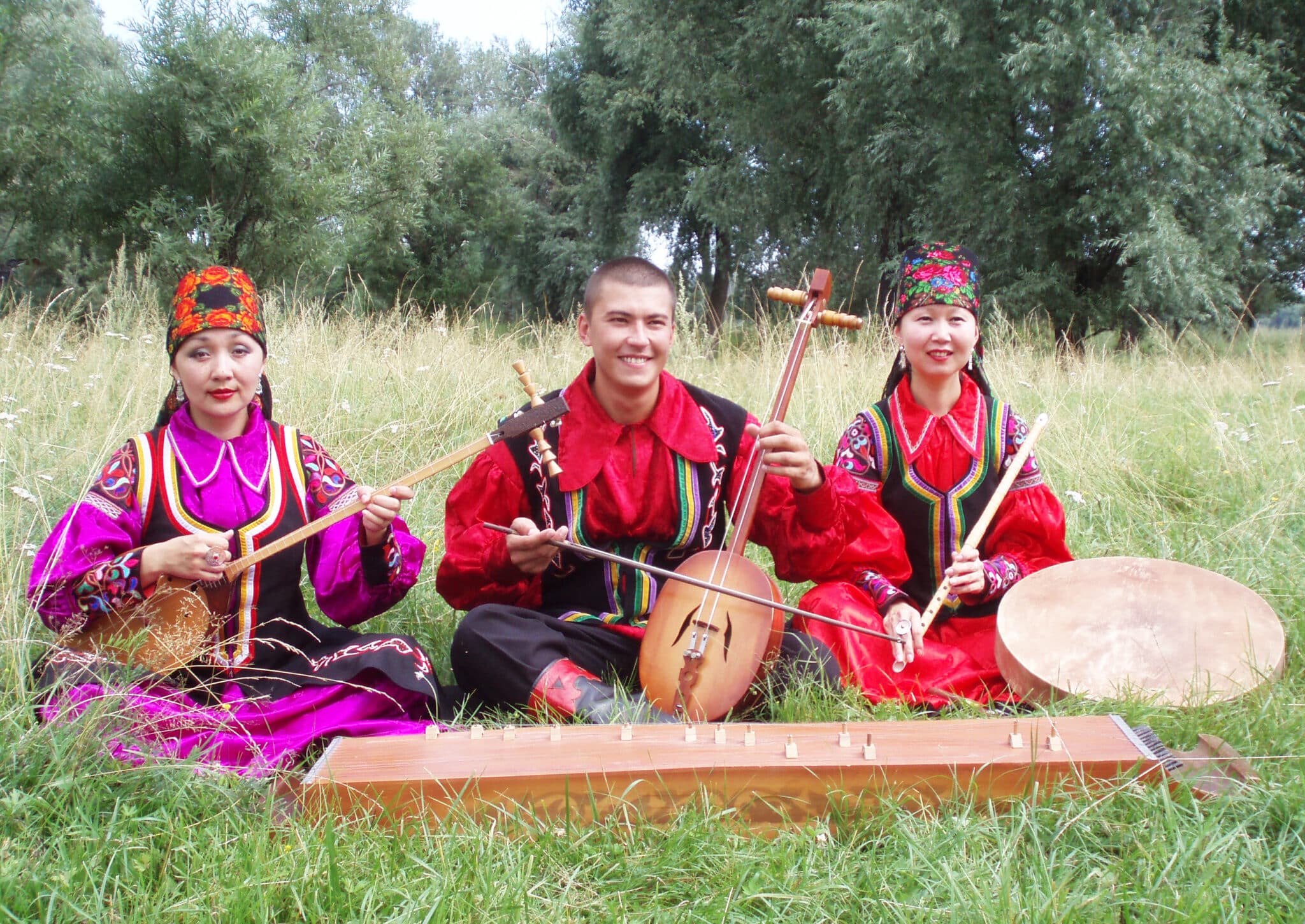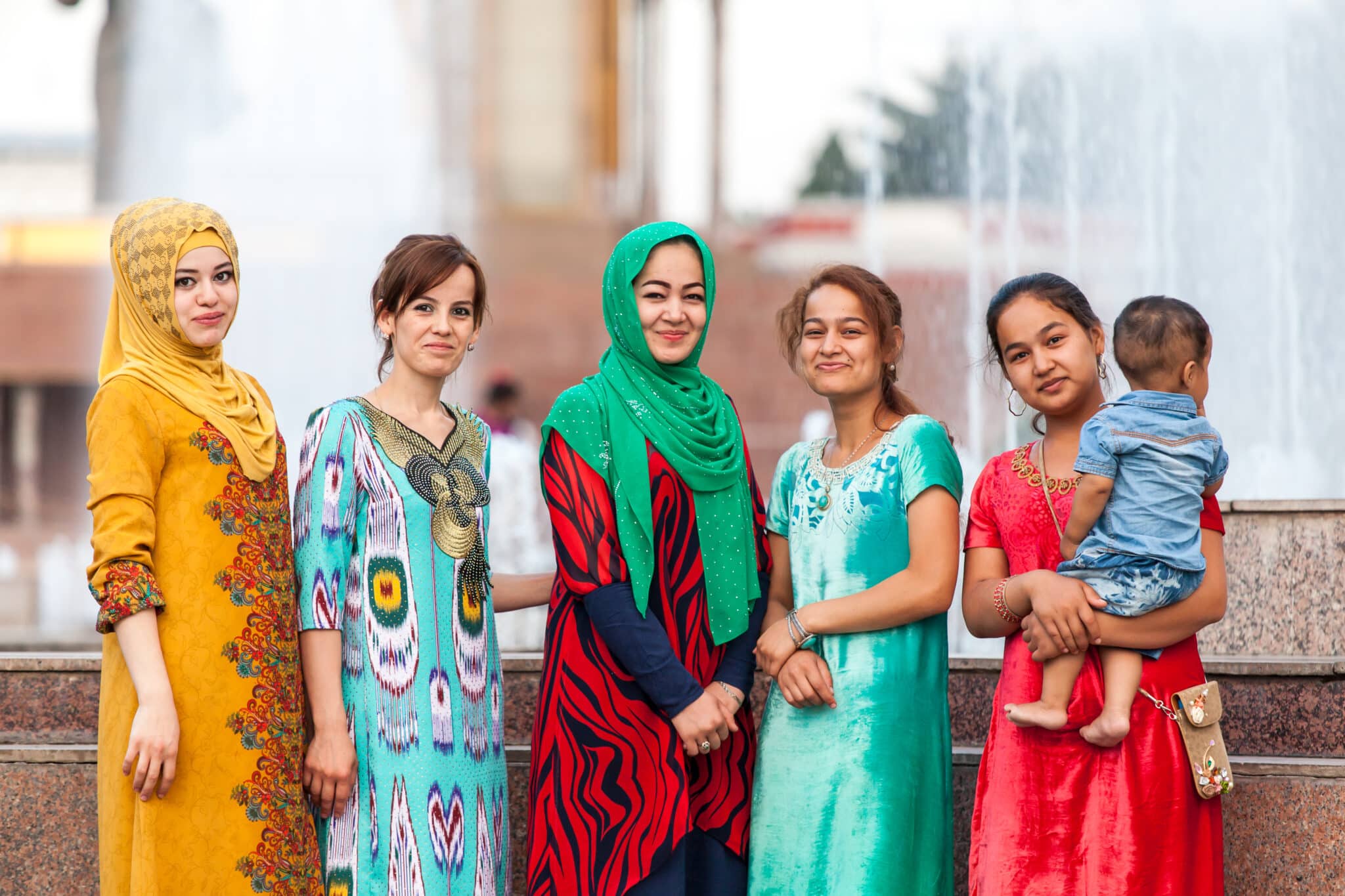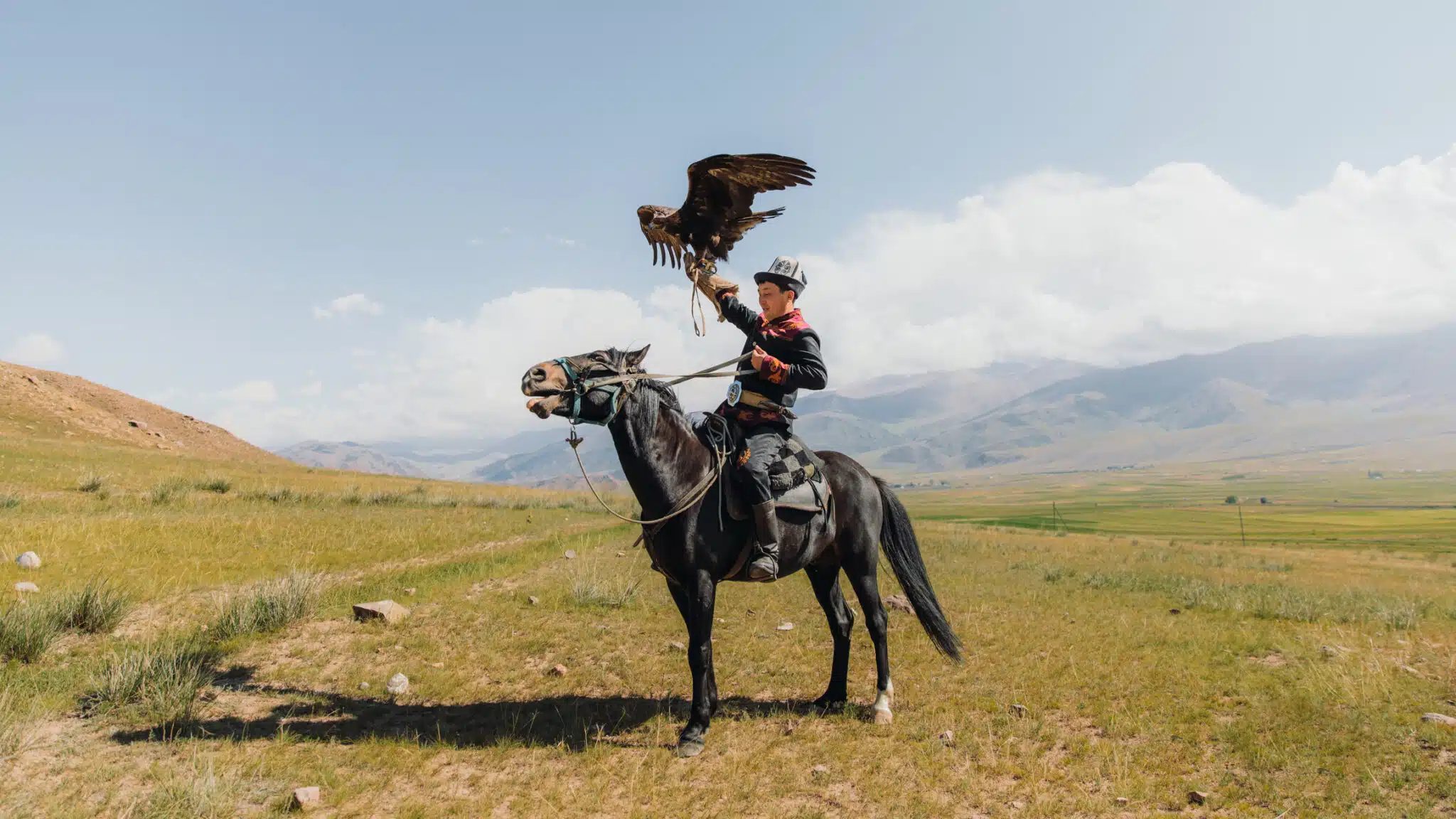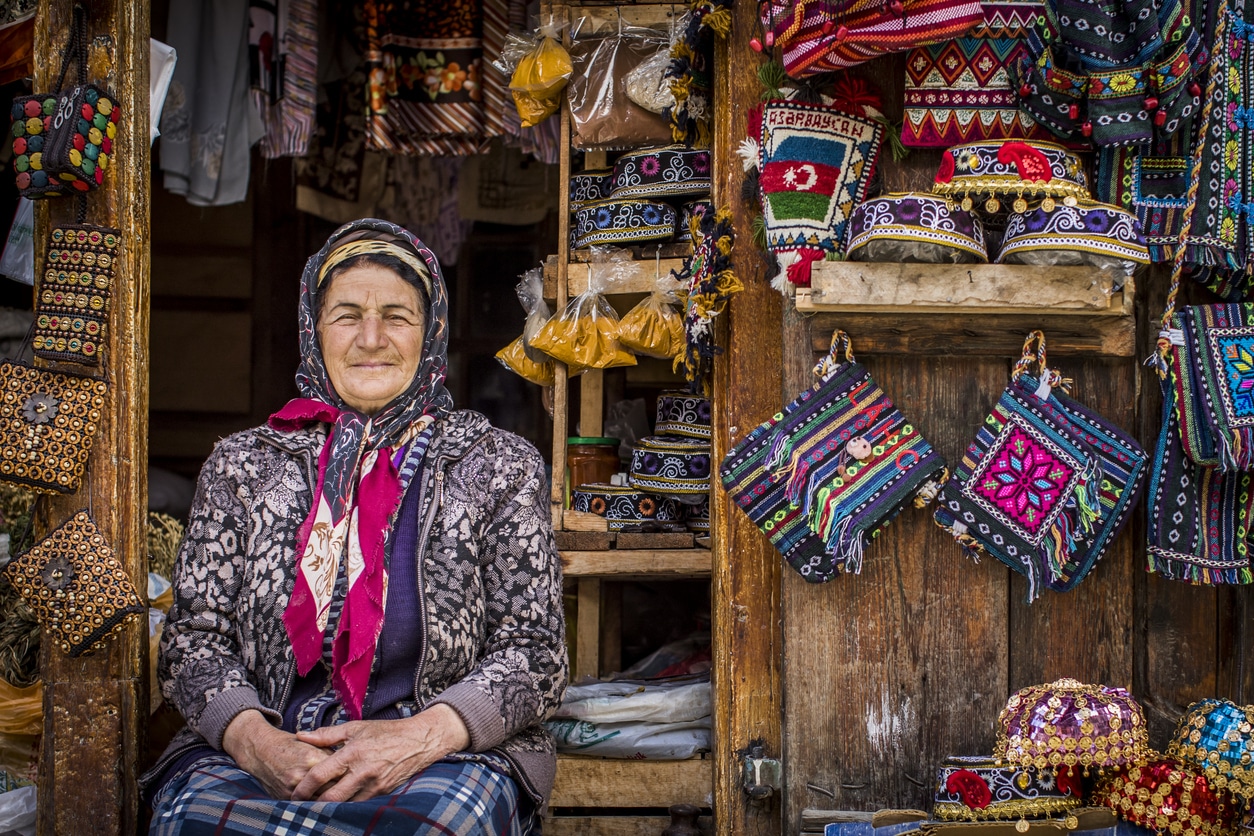The Talking Phrasebook Series presents useful phrases and words in side-by-side translation and with audio files specifically geared to help students work on listening skills and pronunciation. Below, you will find several useful phrases and words. To the left is the English and to the far right is the Azerbaijani translation.
In the center column for each row is a play button. The recorded file will feature first English, then the Azerbaijani in three versions: one slow, one with each syllable broken out, and a last version that will be spoken as it might be overheard in a conversation between native speakers.
10 Facts About Azerbaijani
Status: Azerbaijani is a Turkic language that belongs to the Oghuz branch, which includes Turkish and Turkmen. It shares many similarities with these languages, particularly Turkish.
Azerbaijani and Azeri: Long used interchangeably, these terms are now subject to debate. Some Azerbaijanis see “Azeri” as too informal or even altogether incorrect – instead naming an extinct language related to Persian. Azerbaijanis refer to themselves as “Azerbaijani” in their own language while “Azeri” has been historically used by outsiders, particularly during Soviet times. Many younger Azerbaijanis in particular see claiming “Azerbaijani” over “Azeri” as a way of asserting sovereignty over their identity. While many Azerbaijanis don’t have a strong opinion on this, it is better to use “Azerbaijani” over “Azeri” as the latter will always be considered correct.
Speakers: Azerbaijani is spoken by perhaps 30-35 million people globally. Most speakers live in Azerbaijan and Iran, with significant communities in Russia, Georgia, and Turkey. Estimates of Azerbaijanis living in many areas vary widely. The Iranian census does track ethnicity and thus the number of Azerbaijanis in Iran is unknown. Scholarly estimates vary between 6-23 million. Azerbaijanis may also be undercounted in Russia and Turkey, where official counts of about a half million each might be four to six times greater due to Azerbaijanis staying as guest workers.
Dialects: Azerbaijani has several dialects. The most distinctive split occurs between those spoken in Azerbaijan and Iran. The language spoken in Azerbaijan uses the Latin alphabet and, influenced by the Soviet period, has more Russian loanwords. In Iran, a Persian-Arabic script is used and more Persian influence is seen. However, all dialects of Azerbaijani are mutually intelligible.
Gender: Azerbaijani does not have grammatical gender. There are no distinctions between masculine, feminine, or neuter forms for nouns or adjectives. The Azerbaijani pronoun “o” can mean “he,” “she,” or “it.”
Complex Cases: Like most Turkic languages, Azerbaijani has a complex system of cases. Azerbaijani has six: nominative; genitive; dative; accusative; locative; and ablative (which refers to motion away from something).
Politeness and Respect: To express respect, Azerbaijani uses honorifics like “bəy” (Mr.) for men and “xanım” (Mrs./Ms.), often with surnames or first names. There are also informal pronouns (“sən;” you, singular) and formal (“siz;” you, plural/formal/polite singular). “Sən” and “siz” each has its own conjugative forms for related verbs as well.
Writing Systems: Azerbaijani as used in Azerbaijan has been written in various scripts throughout history. Originally written in Arabic script, it switched and used Latin for much of the 1930s, followed by Cyrillic later in the Soviet era, and eventually back to Latin in 1991 after Azerbaijan’s independence.
Agglutinative Language: Azerbaijani is an agglutinative language, meaning it adds suffixes to a root word to express grammatical relationships. These suffixes indicate things like tense, possession, plurality, or case, with multiple suffixes often attached in sequence. For instance, “kitablarımda” starts with kitab (book), adds the plural suffix -lar, the possessive suffix -ım, and the locative suffix “in” to produce a compounded word meaning “in my books.”
SOV Word Order: The standard word order in Azerbaijani sentences is subject-object-verb (SOV). For example, “I eat bread” would be structured as “Mən çörək yeyirəm” (literally “I bread eat”).
Unique Characters and Sounds in Azerbaijani
C – pronounced as “j”
Ç, Ş – pronounced as “ch” and “sh,” respectively
Ə – pronounced as “a” as in “apple”
H, Ğ, X – all make an “h” sound, but pronounced progressively rougher at the back of the throat
ı – (an “i” with no dot) is pronounced like the Russian letter “ы”
I – pronounced as “ee”
J – pronounced as “zh”
Ö – pronounced as “eu” in the French “adieu”
R – is rolled slightly
Ü – hold your tongue as though saying “ee” but your lips as if saying “oo”
Survival Basics
| Hello! | Salam! *used in formal and informal contexts |
|
| Yes | Bəli (formal) | |
| Yes | Hə (informal) | |
| No | Xeyr (formal) | |
| No | Yox (informal) | |
| Good morning! | Sabahınız xeyir! | |
| Good afternoon! | Günortanız xeyir! | |
| Good evening! | Axşamınız xeyir! | |
| How are you? | Necəsiniz?
*formal |
|
| What’s up? | Nə var nə yox?
*informal |
|
| Good, thanks, and you? | Yaxşıyam, çox sağolun. Bəs siz? | |
| Good bye! | Sağ ol!
*infomal, conversational |
|
| Good bye! | Sağ olun! *formal |
|
| See you later! | Görüşənədək! | |
| Sorry! | Bağışlayın! | |
| Open/closed | Açmaq/bağlamaq | |
| Pull/push | İtələmək/çəkmək *when referring to a door |
|
| Small/big | Balaca/böyük | |
| Do you speak English? | İngilis dilində danışa bilirsiniz? | |
| I don’t speak English. | Mən ingilis dilində danışa bilmirəm. | |
| I only speak a little Russian. | Mən ancaq biraz rusca danışa bilirəm. | |
| I understand | Mən başa düşürəm/anlayıram. | |
| I don’t understand. | Mən başa düşmürəm/anlamıram. | |
| Thank you! | Təşəkkürlər! | |
| Thank you very much! | Çox təşəkkür edirəm! | |
| Very well, thanks! | Çox yaxşı, təşəkkürlər. | |
| Well/Good | Yaxşı | |
| Poor/bad | Pis | |
| Please | Zəhmət olmasa *When asking for something politely |
|
| You’re welcome! | Dəyməz. *when responding to “Təşəkkürlər!” |
|
| You’re welcome! | Buyurun! *More informal |
|
| Excuse me! | Bağışlayın. | |
| A little | Az | |
| Could you speak more slowly? | Daha yavaş danışa bilərsiz? | |
| Could you repeat, please? | Təkrar edə bilərsiniz, zəhmət olmasa? | |
| Could you write that down? | Bunu yaza bilərsiniz? | |
| I would like to make an appointment. | Mən görüş təyin etmək istərdim. | |
| My bag/wallet/passport was stolen | Mənim çantam/pul kisəm/ pasportum oğurlanıb. | |
| I need a doctor! | Həkimə ehtiyacım var! | |
| Call the police! | Polisə zəng edin! |
Introductions in Azerbaijani
| What is your name? | Sizin adınız nədir? (formal) | |
| Pleased to meet you! | Görüşdüyümə şad oldum! | |
| I am 25 years old. | Mənim 25 (iyirmi beş) yaşım var. | |
| How old are you? | Sizin neçə yaşınız var? (formal) | |
| Where are you from? | Siz haradansınız? (formal) | |
| I am American. | Mən Amerikalıyam. | |
| No, I am from Canada. | Xeyr, mən Kanadadanam. | |
| She is Australian. | O, Avstraliyalıdır.
*“O” is unisex and used both for female and male. |
|
| He is Irish. | O, irlandiyalıdır. | |
| We are from New Zealand. | Biz Yeni Zelandiyadanıq. | |
| They are from Wales. | Onlar Uelsdəndirlər. | |
| How do you like Azerbaijan? | Azərbaycandan xoşunuz gəlir? | |
| I like Azerbaijan very much. | Mən Azərbaycanı çox sevirəm. | |
| Have you ever been to Ganja? | Heç Gəncədə olmusunuz?
*formal |
|
| I have never been to Lankaran before. | Mən heç vaxt Lənkaranda olmamışam. | |
| This is my second time in Azerbaijan. | Mən ikinci dəfədir Azərbaycandayam. | |
| What do you do? | Nə edirsiniz?
*formal İşiniz nədir? |
|
| I am a doctor | Mən həkiməm. | |
| I am a teacher | Mən müəlliməm. | |
| I am a businessman | Mən biznesmenəm. | |
| I am a student. | Mən tələbəyəm. | |
| I am on vacation. | Mən məzuniyyətdəyəm. *If you’re working |
|
| I am on vacation. | Mən tətildəyəm. *If you are a student on break |
|
| I am here on business. | Mən iş üçün buradayam. | |
| I am studying here. | Mən burada oxuyuram. |
Asking Directions
| Where are the toilets? | Ayaq yolu haradadır? | |
| Men | Kişi tualeti | |
| Women | Qadın tualeti | |
| Where is the nearest bank? | Ən yaxın bank haradadır? | |
| Where is the nearest post office? | Ən yaxın poçt ofisi haradadır? | |
| Where is the nearest train station? | Ən yaxın qatar stansiyası haradadır? | |
| Where can I find Wi-Fi? | Internet harada tapa bilərəm? *you can also use Wi-Fi instead of Internet |
|
| Do you know the Wi-Fi password? | Wi-Fi’ın şifrəsini bilirsiz? (formal)
*you can also use Internet instead of Wi-Fi. |
|
| How can I order a taxi? | Necə taksi sifariş edə bilərəm? | |
| Straight ahead! | Düz irəli! | |
| Take a right! | Sağa dönün! | |
| Take a left! | Sola dönün! | |
| After the stoplight | İşıqfordan sonra! | |
| Next/First/Last | Növbəti
Birinci Sonuncu |
Shopping
| How much does that cost? | Bu neçəyədir? | |
| The menu, please! | Menyu, zəhmət olmasa. | |
| I’d like a beer, please | Mən pivə istərdim, zəhmət olmasa. | |
| I’d like the bill, please. | Hesabı gətirə bilərsiniz, zəhmət olmasa. | |
| Do you accept credit cards? | Kredit kartı ilə ödənişi qəbul edirsiz? |
Counting
(These are grouped for simplicity – 1-10, 11-20, 21-100, 101-1000)
| 0 | sıfır | |
| 1 | bir | |
| 2 | iki | |
| 3 | üç | |
| 4 | dörd | |
| 5 | beş | |
| 6 | altı | |
| 7 | yeddi | |
| 8 | səkkiz | |
| 9 | doqquz | |
| 10 | on | |
| 11 | on bir | |
| 12 | on iki | |
| 13 | on üç | |
| 14 | on dörd | |
| 15 | on beş | |
| 16 | on altı | |
| 17 | on yeddi | |
| 18 | on səkkiz | |
| 19 | on doqquz | |
| 20 | iyirmi | |
| 21 | iyirmi bir | |
| 22 | iyirmi iki | |
| 30 | otuz | |
| 40 | qırx | |
| 50 | əlli | |
| 60 | altmış | |
| 70 | yetmiş | |
| 80 | səksən | |
| 90 | doxsan | |
| 100 | yüz | |
| 111 | yüz on bir | |
| 125 | yüz iyirmi beş | |
| 200 | iki yüz | |
| 300 | üç yüz | |
| 400 | dörd yüz | |
| 500 | beş yüz | |
| 600 | altı yüz | |
| 700 | yeddi yüz | |
| 800 | səkkiz yüz | |
| 900 | doqquz yüz | |
| 1000 | min |
You’ll Also Love

Armenian Talking Phrasebook
The Talking Phrasebook Series presents useful phrases and words in side-by-side translation and with audio files specifically geared to help students work on listening skills and pronunciation. Below, you will find several useful phrases and words. To the left is the English and to the above right is an English transliteration of the Armenian translation. […]

The Talking Khakas Phrasebook
The Talking Phrasebook Series presents useful phrases and words in side-by-side translation and with audio files specifically geared to help students work on listening skills and pronunciation. Each entry below, divided by category, features an English word or phrase in the left column and its Khakas translation in the right, presented in the original Khakas […]

The Talking Tajik Phrasebook
The Talking Phrasebook Series presents useful phrases and words in side-by-side translation and with audio files specifically geared to help students work on listening skills and pronunciation. Below, you will find several useful phrases and words. To the left is the English and to the far right is the Tajik translation. Tajik uses a Cyrillic […]

The Talking Kyrgyz Phrasebook
The Talking Phrasebook Series presents useful phrases and words in side-by-side translation and with audio files specifically geared to help students work on listening skills and pronunciation. Below, you will find several useful phrases and words. To the left is the English and to the above right is an English transliteration of the Kyrgyz translation. […]

The Talking Punjabi Phrasebook
The Talking Phrasebook Series presents useful phrases and words in side-by-side translation and with audio files specifically geared to help students work on listening skills and pronunciation. Each entry below, divided by category, features an English word or phrase in the left column and its Punjabi translation in the right, presented in the original Punjabi […]





